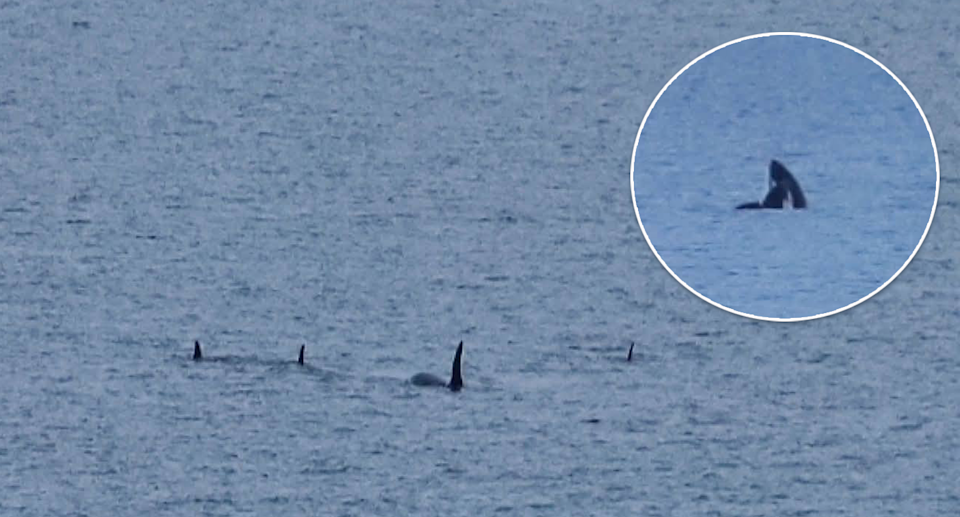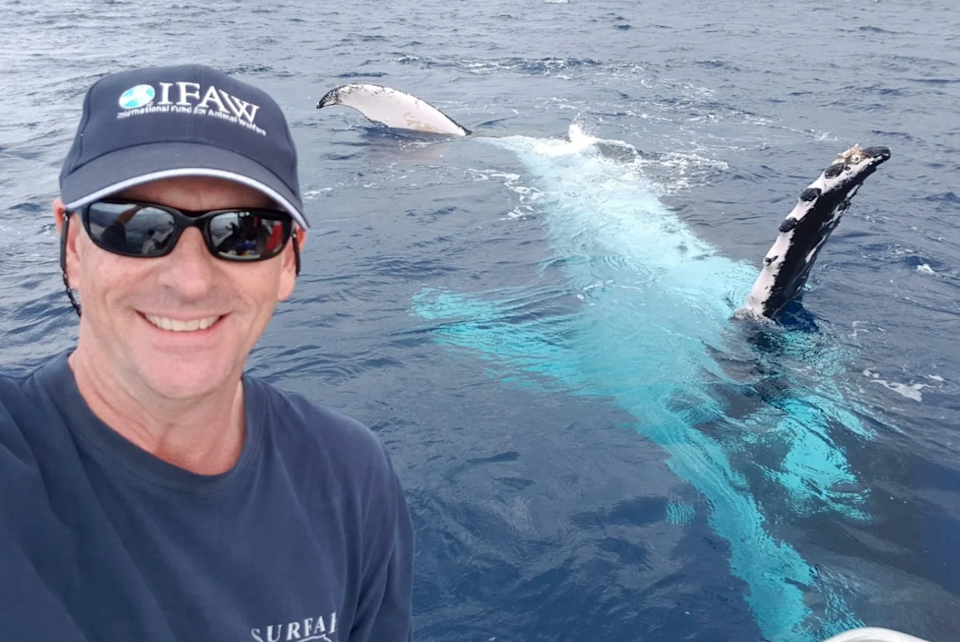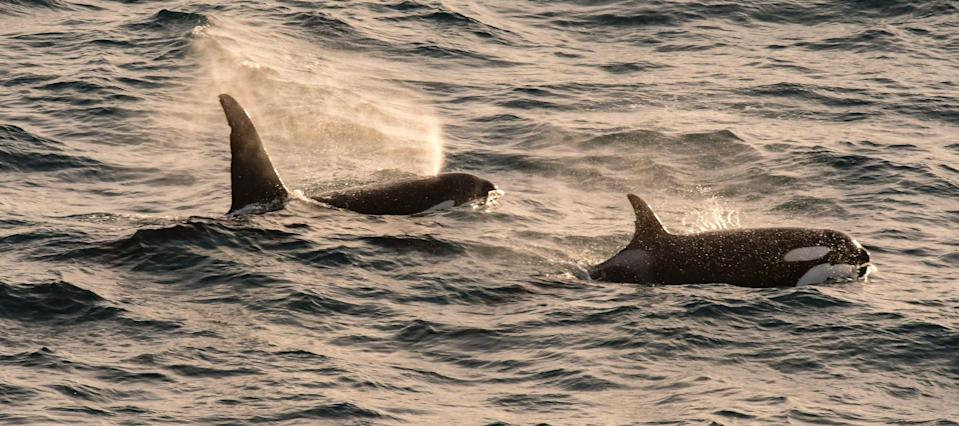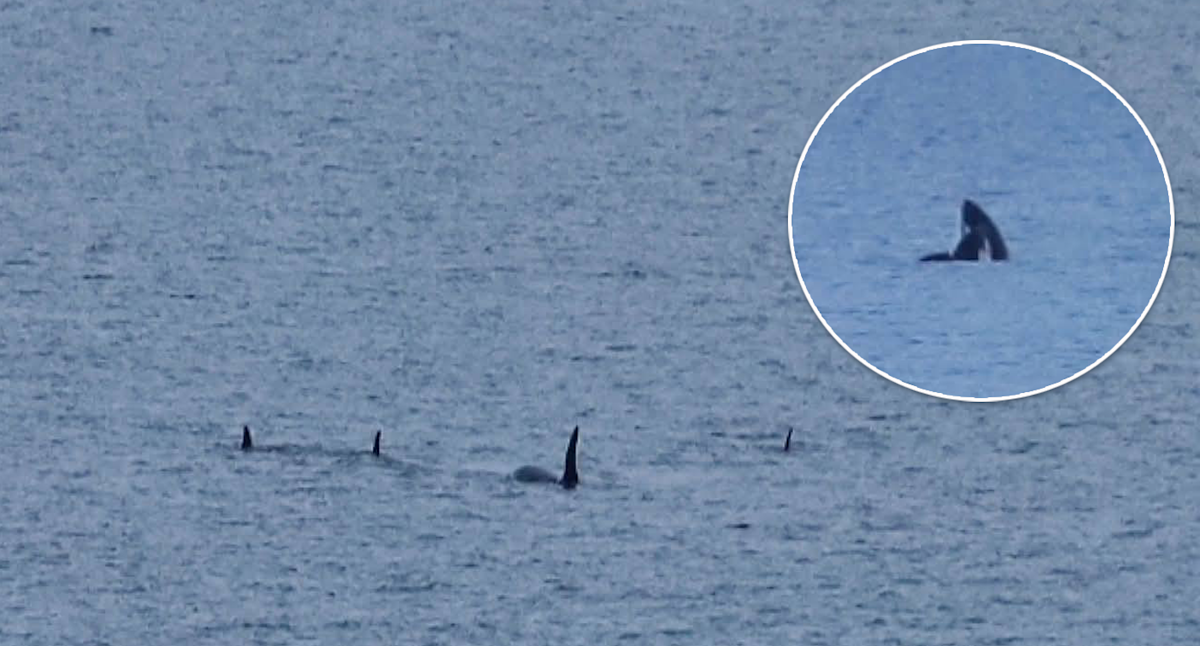Photographer Lucy Bradshaw’s daughter was just getting home on Monday when her excited mother hurriedly ordered her not to bother coming inside the house. They were getting straight into the car, she said.
“I’m waving to her at the window saying, ‘Stay there, like, don’t go anywhere, we’re getting in the car’. And she didn’t know what was happening, because I was obviously very excited,” Lucy told Yahoo News.
The reason for her excitement was about to become clear as they jumped into the vehicle and headed down to the beach. The photographer had been tipped off by a friend that a pod of orcas was near the shoreline at the local Frederick Henry Bay in the southeast of Tasmania.
Despite being a dedicated wildlife and ocean photographer, Lucy had never seen the species in the local area in the more than 40 years she has lived there.
“I couldn’t believe my eyes,” she said of witnessing the apex predators, also known as killer whales.
Turning up yesterday afternoon, there were plenty of people at the lookout, some with binoculars, keen to watch the show as the whales slapped their tails and breached for the excited crowd of onlookers.

Lucy admitted that she ‘lost her s**t’ at seeing the killer whales on Monday. Source: Lucy Bradshaw/Facebook
“There were quite a few people up on the lookout where I was,” Lucy recalled. “Then we decided to head further down the beach to another spot, and there were some longtime locals there I knew. I asked them if they had ever seen them [orcas], and they had both seen them only once previously.
“The people we were first with, they were sort of new to the area and I think they gathered it was pretty rare given how excited I was,” she told Yahoo.
“When I was a kid there’d be southern right whales in the bay, and then it’s progressed to humpback whales, and I’ve seen those feeding in the bay at close proximity, but to see these orcas is mind-blowing.”
‘Very lucky’ to see elusive killer whales off eastern Australia
For about the past five years, marine researcher David Donnelly has headed up the Killer Whales Australia Project that compiles sightings off the Australian coast from ‘citizen scientists’ to better understand the “elusive” creatures.
They are particularly hard to see on the east coast of Australia where they’re “rarely ever sighted” and researchers still don’t fully understand their migration patterns, David told Yahoo News on Tuesday.

David has spent more than two decades working alongside some of the world’s leading marine mammal scientists, studying whales and dolphins across Australia. Source: IslandWhales
When it comes to the eastern seaboard, David said these animals are incredibly elusive.
“They range all up and down the coast, [but] we don’t even know how far they range,” he said. “And when they are present, they’re only present for a relatively short amount of time.”
That’s in stark contrast to Western Australia, where they’re typically present for weeks at a time. “In eastern Australia, it’s almost the opposite — they’re rarely sighted, and when they are, they’re sighted for a brief period,” he said.
That’s why projects like the database cataloguing public sightings are so important in helping to better understand their movements. As researchers build up that information, they have been able to keep track of known individuals, as well as gain better knowledge of their family dynamics and social interactions.

Two killer whales were sighted near Cape Bridgewater in western Victoria late last month. Source: Killer Whale Project Australia/Facebook
When spotting the four female and one male orcas yesterday, Lucy wondered what they would be feeding on in the area.
“Last week, in the area around the Tasman Peninsula, a pod of killer whales were seen chasing and killing common dolphins,” David told Yahoo. “The prey preferences for eastern Australian killer whales are quite diverse — they’ll eat anything from squid to large whales, seals, kingfish, sharks, even sunfish.”
The citizen scientist database of sightings, which David oversees, dates back to 1994. It was initially named the Southern Ocean Orca Database and it includes a few sightings at Frederick Henry Bay, where Lucy and other locals watched on yesterday.
“We’ve got quite a few records from that bay, but they’re spread over 20 years,” he said. “I’m not surprised someone who has lived there for a long time hasn’t seen one… it’s very, very lucky.”
For anyone around the coast who spots a killer whale, they are urged to report it and ideally share photos with the project’s Facebook page.
“Send us a message and we will make your data count for conservation,” David said.

Discover more of our environment coverage.

